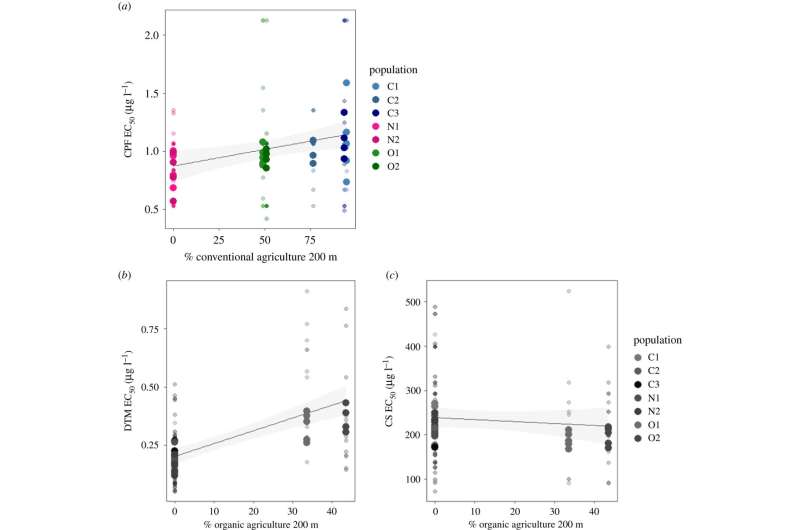December 1, 2021 report
Non-targeted aquatic species found to adapt to both traditional and organic pesticides

A team of researchers with the Laboratory of Aquatic Ecology, Evolution and Conservation, in Belgium has found that non-targeted creatures that are impacted by nearby pesticide applications adapt to both traditional and organic pesticides. In their paper published in the journal Proceedings of the Royal Society B, the group describes testing pond-dwelling water fleas in a variety of environments.
Water fleas are small freshwater crustaceans that live in ponds in a variety of places. In this new effort, the researchers collected samples of the tiny creatures from ponds near conventional farms and organic farms. As a control, they also collected water flea samples from ponds surrounded by natural reserves. All of the specimens came from ponds in Belgium and were close enough to one or the other type of farm to serve as a reservoir of runoff when it rained.
The researchers then tested all of the specimens to determine if they had developed a resistance to the pesticides (they looked for genetic differences from those not exposed to the pesticides) used on conventional and organic farms. Regulators allow organic farmers to use certain natural-origin chemicals to help keeps pests at bay.
The researchers found that specimens from ponds near both the conventional farms and organic farms had developed some degree of resistance to the chemicals that were used near their pond. They also found that water fleas living in ponds near very large conventional farms developed more resistance to the chemicals than was seen in ponds near smaller farms.
The researchers suggest that the application of pesticides to agricultural farms is a stressor to non-targeted species for both types of farming activities and results in adaptations that lead to resistance. They further note that claims of organic farming being safe for non-targeted species may be overstated.
More information: Rafaela A. Almeida et al, Differential local genetic adaptation to pesticide use in organic and conventional agriculture in an aquatic non-target species, Proceedings of the Royal Society B: Biological Sciences (2021). DOI: 10.1098/rspb.2021.1903
Journal information: Proceedings of the Royal Society B
© 2021 Science X Network




















